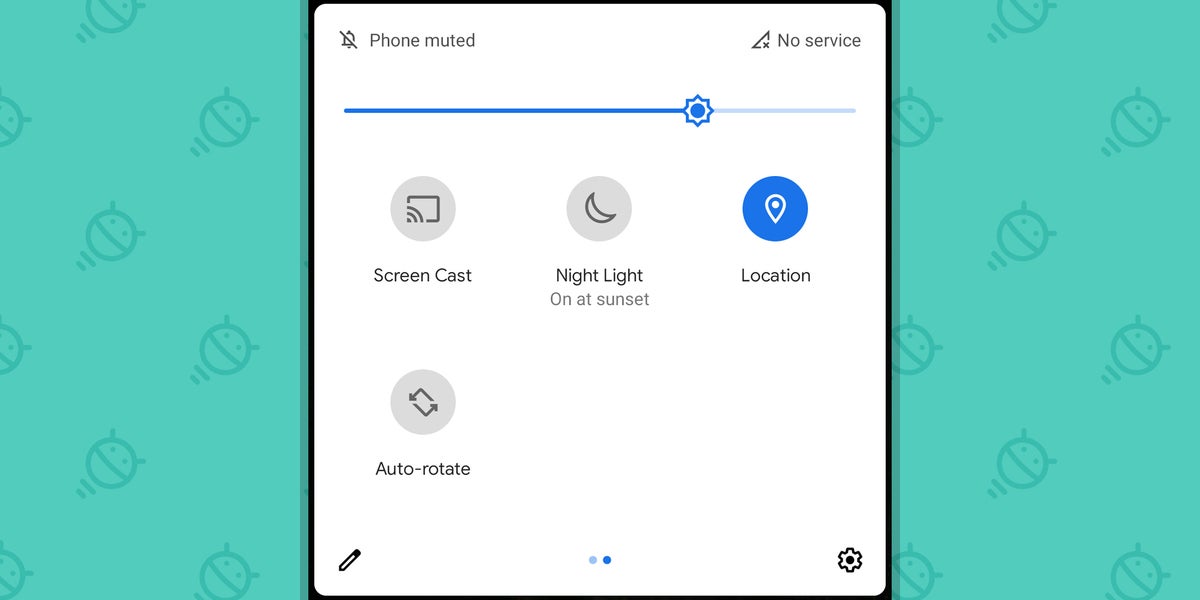If you've read much tech news lately, you might be feeling a slight sense of shock right now.
A series of newly publicized documents related to an Arizona lawsuit reveals that Google's had some complicated systems for collecting location data across Android over the years — and that, according to the info, the company at one point tried putting a catch-all location toggle into the software's Quick Settings panel but saw a substantial increase in the number of users who took advantage of it with that more prominent positioning in place.
Google "viewed the large increase as a problem to be solved," the documents say, and consequently removed the location toggle from Android's Quick Settings panel on its own phones and "sought ... to convince other manufacturers using Android to do the same on the basis of false and misleading information."
Yamma hamma — that's one greasy pancake to chew over. But hang on: Before you soil your britches and bury your phone in the nearest mountain of mustard, there are a few important points to consider here — points that play a significant role in this story and are largely getting lost amidst all the sensational headlines and eye-catching claims.
It's not to say that any of these claims are good, by any means. Of course not! But in their current form, they're lacking some critical context that paints a more nuanced and complete picture of the situation.
Let's dive in, shall we?
1. The location toggle context
One of the more eyebrow-raising revelations in these materials is the part about Google removing that location toggle from Android's Quick Settings because of how too many people were tapping it when it was front and center.
Here's the interesting thing about that, though: Google didn't actually remove that toggle. It's still there.
See?
 JR
JR
The Quick Settings Location toggle, as seen on a Pixel phone running Android 11.
I went back and looked at phones running Android versions as old as 2017's Android 8.0, and the location toggle is present and available in all of 'em — continuing all the way up through the current Android 12 beta release. This is true both on Google's own Pixel phones and on devices made by other manufacturers.
When you look more closely at the court documents, it becomes clear that no one's actually claiming Google flat-out removed that option as a result of the increased activity its presence apparently created. That's the telephone-game version of the story that ended up getting repeated throughout most media reports and social media chatter. The actual information says that Google simply moved that toggle to a secondary page within the Quick Settings panel — as in, one swipe over in that area, where lots of less frequently used toggles reside.
Now, the issue of why Google made that change is a whole other story. (For its part, Google has gone on the record as saying that the Arizona Attorney General and "[its] competitors driving this lawsuit have gone out of their way to mischaracterize [its] services," that it has "always built privacy features into [its] products and provided robust controls for location data," and that it "look[s] forward to setting the record straight.") But regardless, the fact of what actually changed is an important bit of context to consider.
Speaking of which...
2. The Google data context
This whole situation revolves around the realization that Google is making some behind-the-scenes decisions designed to encourage us all to share location data and other such info with the company. That data, in turn, is then used as part of our profiles that determine what sorts of ads we see around the web. And those ads are what allow Google to offer us all of its various services — Search, Gmail, Docs, Drive, you name it — without charging us, at least at the services' base levels.
It's tempting to portray all of this as part of a "surveillance mission," a "war on privacy," and other such accusatory terms. But let's take a second to step back and think about what the situation actually is.
Yes, Google wants to encourage you to give it access to stuff like location data — and yes, it's probably making some design choices that are carefully considered to help accomplish that goal. But, critically, the company is not selling your data or sharing it with anyone. It's using it to programmatically determine what ads you see around the web. And that's all.
(It's probably no coincidence that Google seems to have launched a campaign of sorts to address the misconceptions around this area. I've seen pop-ups in numerous Google apps and services over the past several days pointing out that Google never sells or shares information — and that in some cases, such as with Gmail and Photos, it doesn't even use the associated data for ad targeting purposes. Clearly, Google sees this as being as much about misrepresentation as anything.)
You know what else? Just as that sort of data is core to Google's business, the now-sensationalized notion of "privacy" has become core to lots of other companies' businesses. As I pointed out the other week, bashing Google and selling the idea of "privacy" has become a big business in and of itself, and the manufactured outrage over Google's business model is a core selling point in that arena.
Before you panic over what Google knows about you and what manner of info it's collecting, ask yourself: Do you enjoy using Google services and get some manner of value out of them that you couldn't get at that same level anywhere else? And does the actual Google business model and what the company does with data really bother you all that much?
To quote an exceptionally handsome Google-focused writer I know:
Google's been up-front about how its business works from the very beginning: The company provides us with mostly free services in exchange for allowing it to use certain parts of our data — the things we search for, the stories we click on, and so on — to build up private profiles of our interests. And it then uses those profiles to programmatically show us targeted ads that relate to those interests.
It's worth stating once more: To the best of our knowledge, Google has never sold, shared, or otherwise misused any manner of personal data. That's something that seems to get lost in much of the discussion as of late — the fact that while, yes, privacy is obviously important and worth thinking through carefully, what we're talking about here is simply select areas of our data being compiled to create a profile that's then used internally and automatically to make matches with the sorts of ads we see. And while the defaults do tend to veer toward allowing most manners of access, you can absolutely take control of how your info is used in an ever-increasing number of ways.
If that does bother you, then by all means, you've got some serious thinking to do. With most people, though — myself included — once the practical reality of the situation sets in, the mindset seems to shift from steaming rage to shrugging acceptance.
At the end of the day, Google's a business. And of course it's going to position things in a way that supports the system at the center of its strategy. The same is true for practically every company out there. The specifics of the transaction and what value you're providing in exchange for the service just vary from one instance to the next.
And on that note...
3. The company decision-making context
More than anything, this saga serves as a reminder that, yes, tech-service-providing organizations are profit-seeking entities — and despite the lofty and sometimes genuine stories they love to shower us with, at the end of the day, they're all invested in building up their own businesses and selling a story that supports that goal.
Take Apple, for instance — a company that, more than any other, has latched onto the notion of "privacy" as a selling point as of late. That's all well and good, but let's not forget that Apple's glorified iOS privacy policies are actually poised to boost Apple's own advertising business, as the Wall Street Journal explains:
When targeting users who have opted out of tracking, advertisers who buy ads through third-party platforms will have to wait three days for insights on their campaigns and will receive only aggregate information, such as the total number of users who took an action after an ad, people familiar with Apple’s ad products said.
Advertisers who buy Apple ad space can receive more data about user behavior, the people said. They can learn which version of their ads users saw and which search keywords ads appeared on, they said. Those advertisers will get results nearly in real time, the people said.
And, of course, all the hubbub surrounding the subject is also serving as a strong marketing point for Apple's own primary business model — selling hardware and locking you into its ecosystem so you'll keep buying more and more devices over time. Apple, unlike Google, depends on ongoing hardware sales for the bulk of its income. It's a different model, but just like Google, Apple is selling the story that best positions its business for success.
Then there's Amazon, whose business revolves around getting us all in the habit of turning to its virtual storefront for any and all purchases, all of the time. That's why it sells us on the value of its Prime service and continues to add more and more elements into that arrangement — despite the fact that, as has become increasingly clear over time, the value provided isn't quite as clear cut as it seems.
None of this is to say that these sorts of sometimes-sneaky, arguably deceptive tactics are optimal. They're not. But they're a part of business, for better or for worse — and on some levels, they always have been, even dating back to our pre-technological world.
Ultimately, it's a reminder that it's up to us to look past the surface, assess what's actually going on in any given scenario, and then look out for our own best interests.
The good news is that with Android, specifically, it really isn't all that difficult to do — even if the onus does typically fall upon you to take the initiative. I've got a detailed step-by-step guide to deciding exactly how information can and can't be used on your phone and what tradeoffs are involved in every associated choice. And the amount of control available is only increasing with every year and every new Android version. It's mostly just a matter of figuring out your personal priorities and deciding which is more important to you: preventing your data from being used to show you relevant ads around the web or accepting the various perks of Google services that come along with that exchange.
The power to decide is in your hands — and so, too, as this situation reminds us, is the responsibility to make that decision.
Sign up for my weekly newsletter to get more practical tips, personal recommendations, and plain-English perspective on the news that matters.





















































































